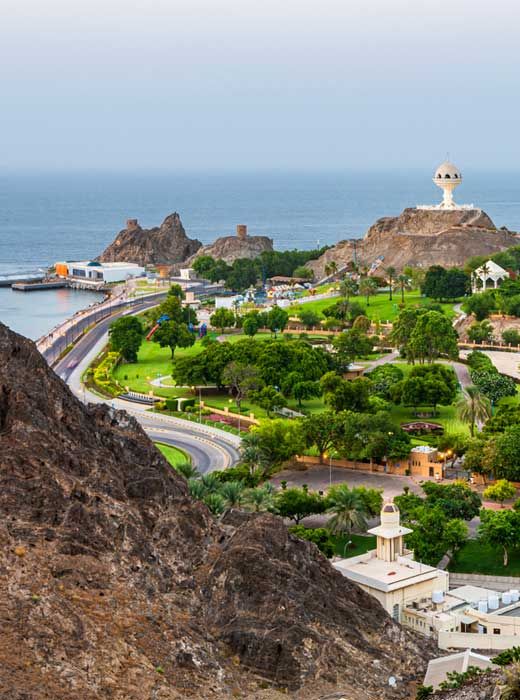Travel Information
Your partner in orient
Travel Information
Your partner in orient
Oman Orientation
Nestled on the southeastern tip of the Arabian Peninsula, Oman is a land rich in history, culture, and natural beauty. Known for its warm hospitality, Oman offers visitors a unique blend of ancient traditions and modernity.
Geography and Climate
Oman boasts a diverse landscape, ranging from rugged mountain ranges like Jebel Akhdar to vast deserts, including the Wahiba Sands, and pristine coastlines along the Arabian Sea. The climate varies, with coastal areas experiencing hot and humid weather, while the interior deserts are known for their extreme heat in the summer and cooler nights during winter.
History and Culture
Oman has a history that stretches back thousands of years, with evidence of settlements as far back as the Bronze Age. The country is famous for its role in the ancient spice trade and its skilled sailors. Oman's culture is deeply rooted in Islamic traditions, but it is also influenced by its past connections to Africa, India, and Persia.
Visitors will notice the strong emphasis on preserving heritage, seen in the well-preserved forts, traditional markets (souqs), and the country's distinctive architecture. Oman's most important religious site, the Sultan Qaboos Grand Mosque, is a stunning example of Islamic art and architecture.
People and Customs
The people of Oman are known for their friendliness and hospitality. Arabic is the official language, but English is widely spoken, especially in tourist areas. Omanis are proud of their customs, and it’s important for visitors to respect local traditions. Dress modestly, particularly in rural areas and when visiting mosques, and always ask permission before photographing people.
Attractions and Activities
Oman offers a wide array of attractions for every type of traveler. From the ancient city of Nizwa, home to the iconic Nizwa Fort and souq, to the stunning fjords of Musandam, Oman is a haven for history buffs and nature lovers alike.
For those seeking adventure, hiking in the Al Hajar Mountains, exploring the vast Rub' al Khali (Empty Quarter), or diving in the crystal-clear waters of the Daymaniyat Islands are popular activities. Oman also offers a rich array of festivals, from camel races to traditional dhow sailing competitions.
Conclusion
Oman is a hidden gem in the Arabian Peninsula, offering an authentic travel experience that blends history, culture, and natural beauty. Whether you’re exploring ancient forts, experiencing the tranquility of the desert, or enjoying the vibrant local markets, Oman promises a journey like no other.
OMAN TIME ZONE
![]() When in Oman, remember to adjust your watch to the local time. The country is three hours ahead of GMT during the winter and summer months. This simple step ensures that you stay in sync with the local time as you travel within Oman.
When in Oman, remember to adjust your watch to the local time. The country is three hours ahead of GMT during the winter and summer months. This simple step ensures that you stay in sync with the local time as you travel within Oman.
LANGUAGE
![]() Arabic stands as the official language of Oman. However, English holds significant prominence, particularly within urban areas. Omanis, often having traveled extensively and received education abroad, possess strong English proficiency. Additionally, while to a lesser degree, languages such as French, German, Italian, and Spanish are also spoken
Arabic stands as the official language of Oman. However, English holds significant prominence, particularly within urban areas. Omanis, often having traveled extensively and received education abroad, possess strong English proficiency. Additionally, while to a lesser degree, languages such as French, German, Italian, and Spanish are also spoken
ELECTRICAL INFORMATION
![]() In Oman, the electrical system operates on 220 AC volts with a frequency of 50 cycles. To connect your devices, you'll need rounded two-prong wall plugs. If you're coming from the US, remember to bring a transformer for your electronics as the voltage differs. Fortunately, most hotels in Oman offer transformers for your convenience.
In Oman, the electrical system operates on 220 AC volts with a frequency of 50 cycles. To connect your devices, you'll need rounded two-prong wall plugs. If you're coming from the US, remember to bring a transformer for your electronics as the voltage differs. Fortunately, most hotels in Oman offer transformers for your convenience.
TIPPING ETIQUETTE
![]() As you traverse Oman, you'll quickly recognize that tipping is a customary practice, intricately woven into the culture. It's important to note that tipping isn't obligatory; rather, it's a gesture meant to reflect the quality of service received. While those in the tourism industry do receive decent fixed salaries, tips serve as supplementary income. In certain situations, a service charge of 10% might be included in hotel and restaurant bills. Remember, tipping is a tangible way to show appreciation for exceptional service.
As you traverse Oman, you'll quickly recognize that tipping is a customary practice, intricately woven into the culture. It's important to note that tipping isn't obligatory; rather, it's a gesture meant to reflect the quality of service received. While those in the tourism industry do receive decent fixed salaries, tips serve as supplementary income. In certain situations, a service charge of 10% might be included in hotel and restaurant bills. Remember, tipping is a tangible way to show appreciation for exceptional service.
CURRENCY DETAILS
![]() In Oman, the official currency is the Omani Rial, often abbreviated as "OMR.". The Rial maintains a fixed exchange rate with the US dollar. Presently, the exchange rate stands at OMR 38.50 for every 100 US dollars. While the US dollar is commonly accepted, it's recommended to haveOmani Rial on hand for your travels within the country. This ensures smoother transactions and a seamless experience during your journey throughout Oman.
In Oman, the official currency is the Omani Rial, often abbreviated as "OMR.". The Rial maintains a fixed exchange rate with the US dollar. Presently, the exchange rate stands at OMR 38.50 for every 100 US dollars. While the US dollar is commonly accepted, it's recommended to haveOmani Rial on hand for your travels within the country. This ensures smoother transactions and a seamless experience during your journey throughout Oman.
CREDIT CARDS AND TRAVELER'S CHEQUES
![]() During your travels in Oman, you'll find that Visa and MasterCard are widely accepted, with American Express also being accepted but to a somewhat lesser extent, primarily in most shops. As for traveler's cheques, they can be converted into cash at exchange shops. However, it's important to note that a commission of up to 5% might apply for this service.
During your travels in Oman, you'll find that Visa and MasterCard are widely accepted, with American Express also being accepted but to a somewhat lesser extent, primarily in most shops. As for traveler's cheques, they can be converted into cash at exchange shops. However, it's important to note that a commission of up to 5% might apply for this service.
OMAN'S CLIMATE INSIGHT
Oman boasts a diverse landscape, ranging from rugged mountain ranges like Jebel Akhdar to vast deserts, including the Wahiba Sands, and pristine coastlines along the Arabian Sea. The climate varies, with coastal areas experiencing hot and humid weather, while the interior deserts are known for their extreme heat in the summer and cooler nights during winter.

VISA REQUIREMENTS
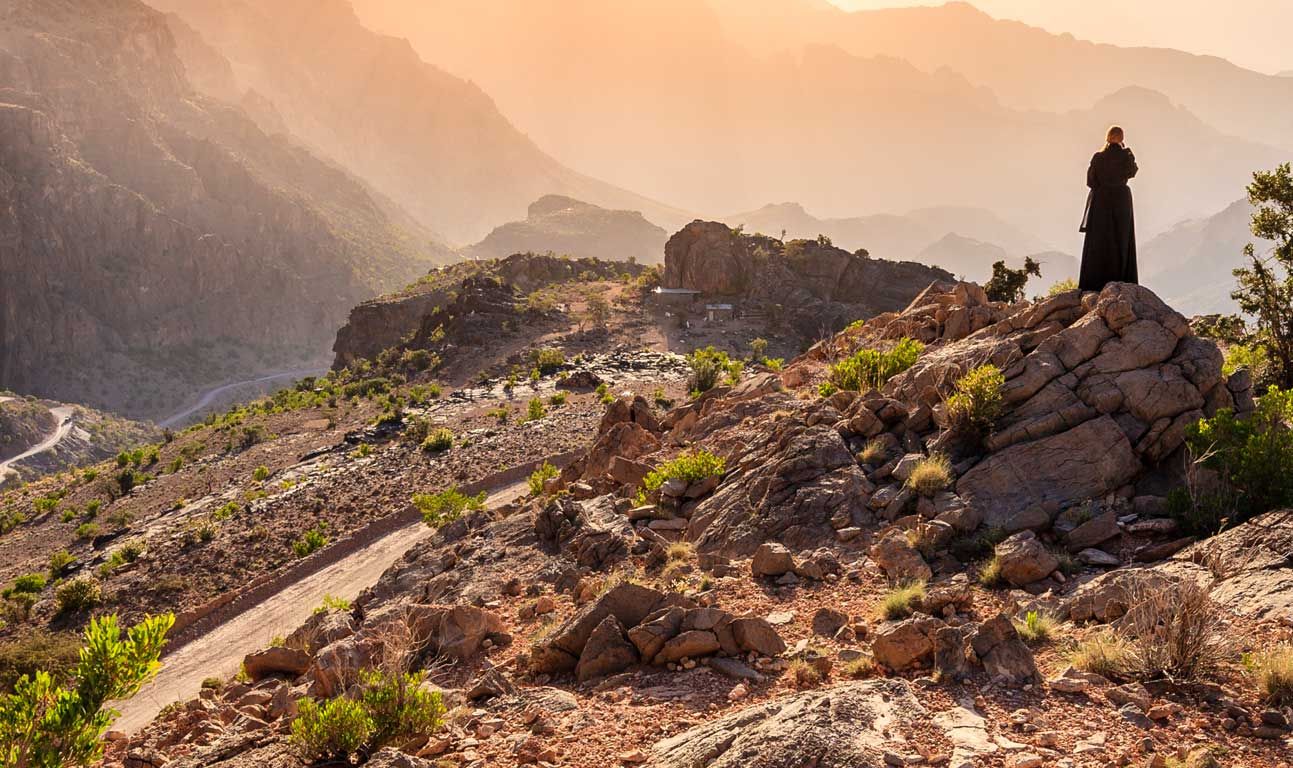
For anyone considering a journey to Oman, it's essential to note that Most foreign nationals must acquire tourist visas. The convenience of obtaining a visa extends to Oman International Airport and numerous land and sea borders, catering to most nationalities. To avail this, all that's needed is the submission of comprehensive passport details before your arrival.
DEPARTURE FEES & TAX
Upon leaving Oman, a departure fee is required at all borders. This fee is already incorporated into your flight ticket if you're departing by air; however, it's necessary to settle the fee separately when departing through land borders.
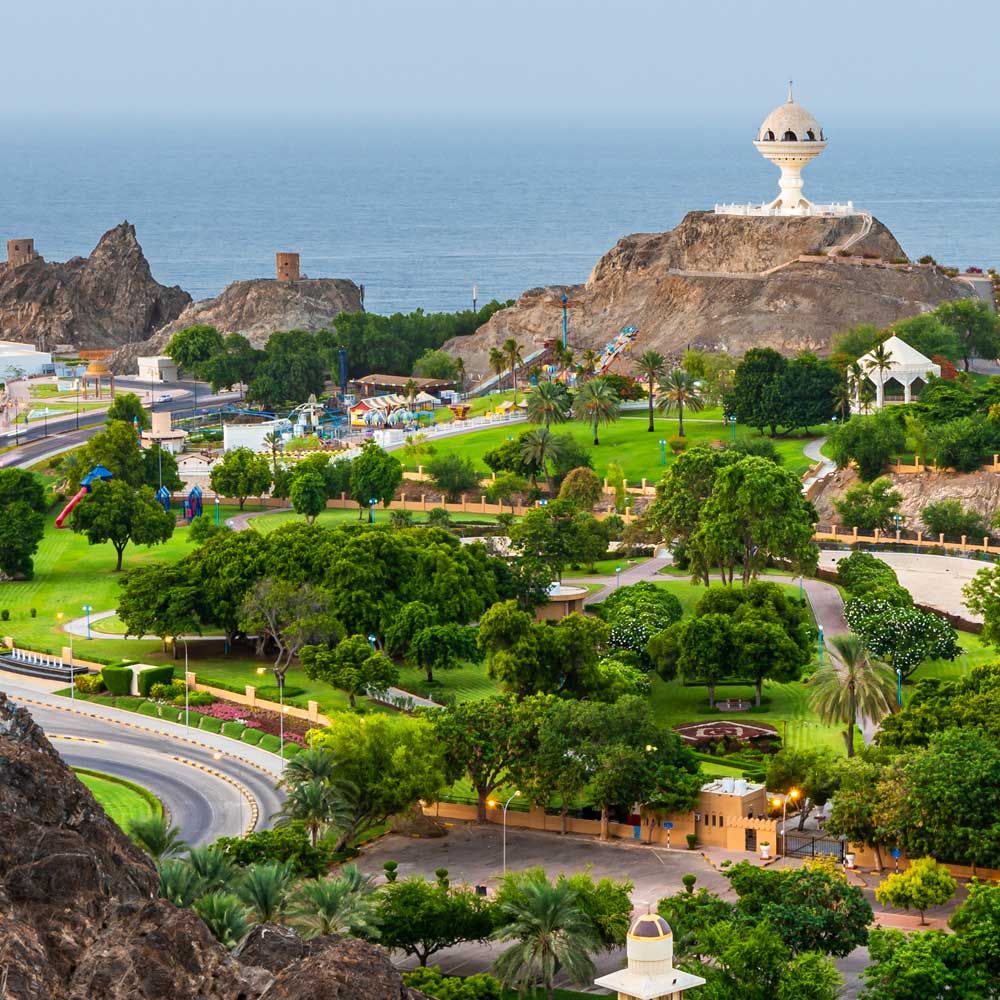
CLOTHING SUGGESTIONS, PHOTOGRAPHY & HEALTH TIPS
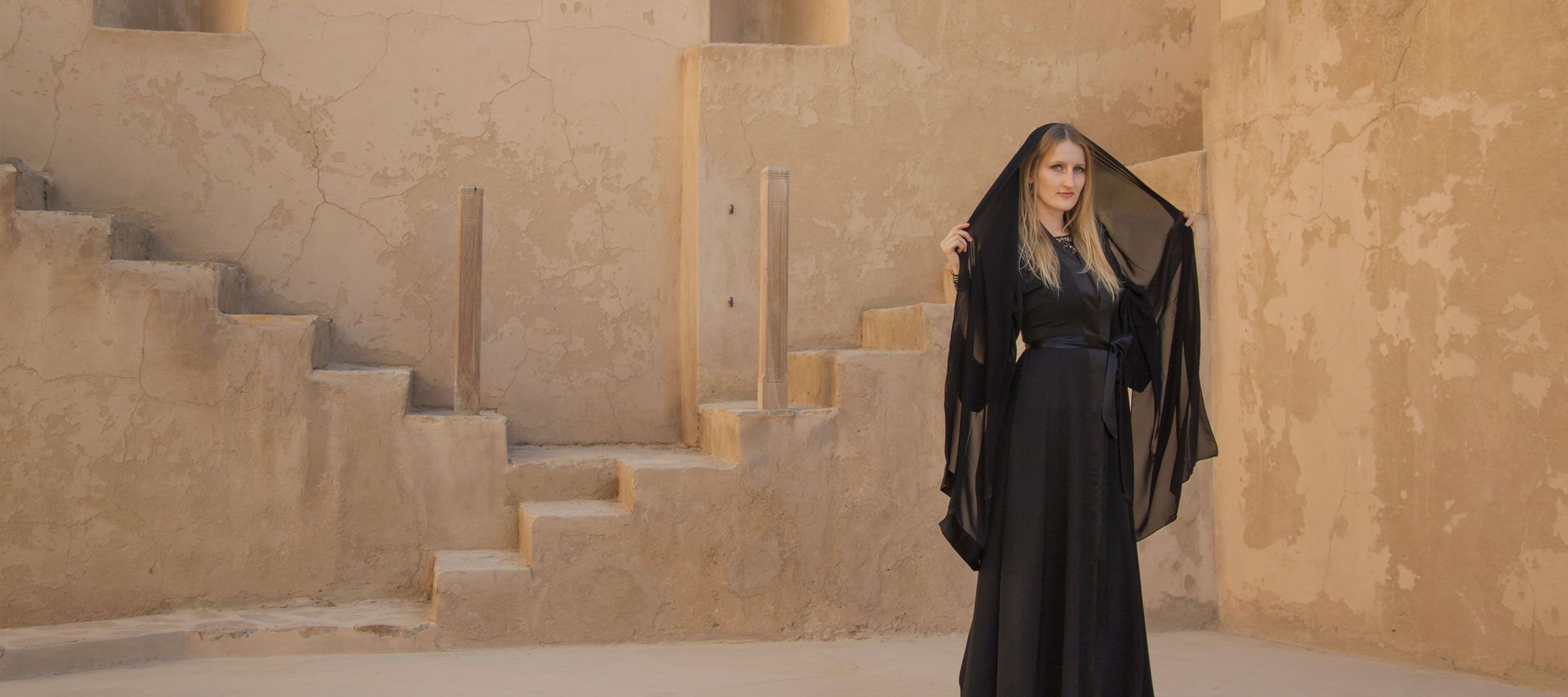
When visiting Oman, it’s important to dress appropriately, keeping in mind the country’s cultural norms and climate. While Omanis are known for their warm hospitality and open-mindedness, modest dress is expected, especially in more traditional and rural areas. Here's a guide to clothing suggestions for tourists:
Modest Clothing
Men: T-shirts or shirts with short or long sleeves are acceptable. Shorts are common in tourist areas, but longer trousers or lightweight pants are recommended, especially when visiting religious sites or rural areas.
Women: Shoulders and knees should be covered in most public spaces. Light, loose-fitting clothing such as long skirts, dresses, or pants paired with modest tops are ideal. A shawl or scarf can be useful to cover the head when visiting mosques or conservative areas.
Lightweight Fabrics
Oman’s climate can get extremely hot, especially in the summer months, so choose breathable, lightweight fabrics such as cotton, linen, or moisture-wicking materials. These help to stay cool while providing coverage from the sun.
Footwear
Comfortable shoes, such as sandals or walking shoes, are a must, especially for exploring cities, markets, or trekking through mountainous and desert areas. Closed-toe shoes may be better for outdoor activities like hiking or dune bashing.
Swimwear
While swimsuits are acceptable at hotel pools or private beaches, it's important to cover up with a loose-fitting shirt or dress when walking through public areas. Bikinis are generally not appropriate on public beaches. Modest swimwear is advised for women, and men should avoid wearing overly revealing swimwear.
Headscarf for Women
Though not mandatory in Oman, carrying a scarf is helpful, especially when entering mosques or conservative areas where covering your head is expected. A scarf can also offer sun protection.
Sun Protection
Given the intense heat and sun exposure in Oman, it’s wise to pack a wide-brimmed hat, sunglasses, and sunscreen with a high SPF. These items will protect you from the harsh desert sun while keeping you cool.
Special Occasions
If you’re attending a special event or a traditional ceremony, consider dressing more formally. Men can wear a collared shirt and trousers, while women may opt for a dress or a traditional abaya, though this is not required.
By dressing modestly and considering the local customs, you’ll ensure a respectful and comfortable experience while traveling through Oman.
SHOPPING EXPERIENCE
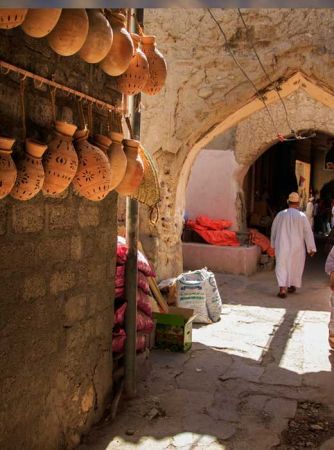
Oman offers a unique shopping experience that blends traditional souqs, bustling with history, and modern malls that cater to every need. Whether you’re looking for handmade crafts, aromatic spices, or high-end luxury goods, Oman provides a diverse range of options for shoppers.
1. Traditional Souqs (Markets)
Omani souqs are an essential part of the shopping experience, offering visitors a glimpse into the country’s rich heritage. These traditional markets are known for their vibrant atmosphere, bargaining culture, and wide variety of goods.
- Muttrah Souq (Muscat): One of the oldest and most famous souqs in the Middle East, Muttrah Souq is a must-visit for any traveler. It’s a labyrinth of narrow alleyways filled with stalls selling Omani silver jewelry, traditional textiles, frankincense, spices, and handcrafted items like khanjars (Omani daggers) and pottery.
- Nizwa Souq: Located in the historical city of Nizwa, this souq is famous for its local handicrafts, pottery, and silverware. It’s also a great place to find traditional Omani halwa (a local sweet) and freshly ground spices.
- Salalah Souq: Known for its high-quality frankincense, Salalah Souq is a treasure trove for those interested in incense, perfumes, and traditional Omani clothing.
Shopping Tips:
- Bargaining is a common practice in souqs, so don’t hesitate to negotiate for a better price.
- Cash is preferred in most souqs, though some vendors accept credit cards.
2. Modern Malls
Oman’s urban centers, particularly Muscat, are home to a growing number of modern malls that offer a luxurious shopping experience. These malls house international brands, restaurants, cinemas, and entertainment for families.
- Mall of Oman (Muscat): The largest mall in Oman, Mall of Oman features high-end fashion, electronics, beauty products, and more. It also has a vast food court, hypermarket, and family entertainment options like cinemas and play areas.
- Muscat City Centre: A popular shopping destination, Muscat City Centre offers a mix of local and international brands, from fashion and accessories to electronics and home goods.
- Avenues Mall: This mall is known for its wide range of fashion boutiques, cafes, and entertainment options like bowling and gaming zones, making it ideal for families.
Shopping Tips:
- Malls often have fixed prices, so bargaining is not practiced.
- Credit cards are widely accepted in malls, and ATMs are readily available.
3. Omani Handicrafts and Souvenirs
Oman is renowned for its high-quality traditional crafts, many of which make for great souvenirs:
- Omani Silver: Handcrafted silver jewelry, including rings, bracelets, and necklaces, is a prized possession in Oman. Khanjars, or traditional daggers, are also crafted from silver and often displayed as symbols of Omani culture.
- Frankincense: Oman is one of the world’s largest producers of frankincense, particularly from the Dhofar region. Frankincense is used in perfumes, incense, and traditional medicine.
- Pottery and Textiles: Nizwa and Bahla are famous for their handmade pottery, while Omani textiles like shawls, scarves, and dishdashas (traditional garments) are beautifully crafted.
- Perfumes and Oils: Oman is known for its rich perfume culture, particularly attar (essential oils). Amouage, a luxury Omani perfume brand, is world-renowned for its unique fragrances.
4. Unique Finds in Oman
- Omani Halwa: This traditional sweet made from dates, rose water, and saffron is a popular delicacy and can be found in most souqs and specialty shops.
- Spices: Oman’s spice markets are filled with exotic spices like saffron, cardamom, cinnamon, and cloves. These aromatic treasures make for excellent gifts or kitchen essentials.
5. Shopping Etiquette
- Dress Modestly: Even when shopping, it’s important to respect Oman’s cultural norms by dressing modestly, especially when visiting traditional markets.
- Cultural Sensitivity: Always ask for permission before taking photos in markets, especially of vendors or their goods.
- Timing: Many souqs close during the afternoon and reopen in the evening. Modern malls are typically open from morning until late evening.
Conclusion
Shopping in Oman is an exciting journey through the country’s rich cultural heritage and modern luxuries. From wandering through centuries-old souqs to browsing international brands in state-of-the-art malls, Oman offers a diverse and fulfilling shopping experience for all types of travelers.


